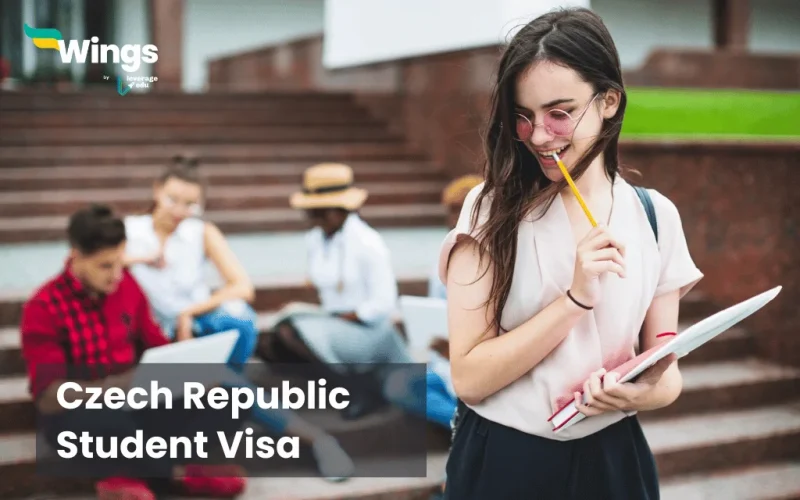The availability of top-notch academic options, reasonable living expenses, and an attractive student lifestyle all in one secure location has helped the Czech Republic become an increasingly popular study-abroad destination. First things first, if you’re looking for a truly unique experience as an international student, then our guide to the Czech Republic Student visa will ease your entire journey and will be very helpful to you.
This Blog Includes:
Why Czech Republic a Perfect Destination to Study?
Many people have a wish list of potential locations for their overseas education. When deciding what to study abroad, you must make informed decisions. Here are some reasons why you should strongly consider choosing the Czech Republic for your higher education, even though every country has something special to offer:
- The history of higher education in the Czech Republic extends back to the fourteenth century. In addition to the longstanding reputations of Czech universities, overseas students can choose from a wide range of innovative academic subjects and creative conceptions.
- There are more than 1000 degree programs offered in English. The good news is that studying in the Czech Republic does not need you to speak Czech fluently.
- Best part yet! International students can study in the Czech Republic without spending a fortune.
- The Czech Republic is one of the world’s top 10 safest nations, which, in addition to the country’s affordable higher education, is another reason you might fall in love with it.
About Czech Republic Student Visa
Now let’s talk about the most important component, which requires special attention- the VISA. If you make a minor error, you risk getting rejected. However, depending on why you’re visiting, you can apply for a number of different visas for the Czech Republic.
- You do not need a visa to study in the Czech Republic if you are a student from the EU/EEA or Switzerland.
- Students must possess a current passport or national ID card in order to enter the Czech Republic.
- For visits longer than 90 days, students must apply for a long-term visa. You should apply for a long-term residency permit for educational purposes if you are studying abroad for a duration that is longer than a year.
Difference between Schengen Visa and the Long-Term Visa
You must understand the distinction between Schengen and Long-term Visas before applying for a visa:
| Schengen Visa | Long-Term Visa |
| It is a temporary or a short-term visa. There is a maximum stay of 90 days. | Long-term visas can stay for a more extended period of time. |
| Visa extensions are not permitted. | Extendable |
| Is only granted for travel, visiting family, short-term study, and medical needs. | It is granted for a job, study for a longer period of time, and family reunification. |
| Do not require a sponsor | You require a sponsor (e.g., your school, employer, or spouse) |
| Can stay without a residency permit. | You must register your address and apply for a residency permit. |
Documents
Now that you have a good understanding of the distinctions between a long-term and short-term visa, let’s speak about the documentation required for it:
- Application form
- Proof of acceptance to studies at a university in the Czech Republic
- Valid passport
- Evidence of sufficient funds for the stay (i.e. bank statements or scholarship information)
- Confirmation of accommodation
- Valid international health insurance
- Copy of a criminal record report
Pro Tip! It is always a good idea to have all documentation translated into Czech by a translator with an official rubber stamp on it when applying for a Czech Republic student visa.
Application Process
- Once you have received an acceptance letter from your dream university, you next must schedule an appointment at the consulate or Czech embassy in your country.
- Ensure you have filled all sections of the visa application form
- The next step is to gather all required documents alongside your application form.
- Show up for your appointment with the embassy, and make sure you have all the requested documents with you.
- Pay the visa application fee.
- Depending on how complex your application is, the period of time it takes to process your visa can vary, but it shouldn’t be more than 120 days.
- You can start the application procedure for a residence permit as soon as your visa has been granted. You’ll need to make another appointment with the Czech embassy or consulate for a residence permit application.
Work While Studying on Student Visa
When given a Czech student visa, they are allowed to work in addition to studying, however, the number of hours they can work each week is limited to 20. This will guarantee that students give their studies ample time and attention. Additionally, applying individually for a work permit is not necessary because this right to work is automatically provided as part of the visa permissions.
FAQs
Ans: Yes, If your visa application is rejected, the consular office will send you a letter explaining why it was rejected. You are then entitled to reapply.
Ans: In such a case you can submit an appeal within 15 days, for which 60 Euros (INR 4,806) is applicable as a payment against a decision to refuse your application for a visa.
Ans: It generally takes 15 days to 45 days, depending on the case and the application time.
One of the most intriguing and hospitable nations in the entire world is the Czech Republic. To learn more about it and to ensure a smooth process, get in touch with the team of experts at Leverage Edu.


 One app for all your study abroad needs
One app for all your study abroad needs












 60,000+ students trusted us with their dreams. Take the first step today!
60,000+ students trusted us with their dreams. Take the first step today!